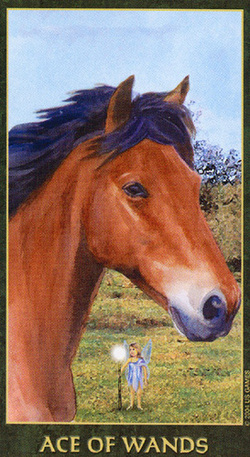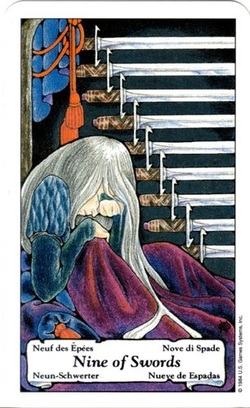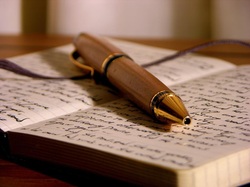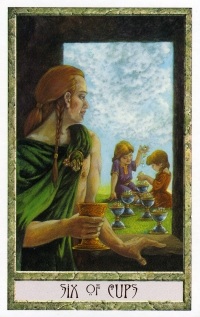 The card for this week is the Ace of Wands, and again it's reversed, showing a lot of blocked energy in terms of focus, drive, and creativity. The things that are blocked in our lives are often the things we most need to unblock and learn. To me, that's why one of the interpretations of Tarot reversals is to pay special attention to the card and bring it into focus in your life.
The deck this week is the Forest Folklore Tarot, a deck by illustrator Kessia Beverley-Smith that draws inspiration from the New Forest in England. All the Wand cards in this deck have the same blonde, dainty fairies as shown in this first card -- which is interesting to me, because I'd have taken that kind of coloring for an Air fairy, and I've seen horses used to represent Earth. Associations are often so subjective, which can sometimes make them hard to navigate when you're using them to perform magick, or even to inspire you personally. But they can also lead to some really cool outside-the-box thinking.
Because I look at that image and I see a very powerful, spirited, free animal standing as a backdrop over the very beginning of the Wands cycle, a small light of inspiration and spirit that will soon grow and increase. I'm going to be starting a group read of The Fire Starter Sessions soon, and I'm really excited to see what changes it creates in my life and my business. I do have dreams and visions for my life, visions I want to create - but it's so easy to get our way blocked by the fear and the overwhelming choices. We don't know how to just keep moving forward in a continued exercise in growth.
But the beauty of the Ace is that it'll soon expand into two, three, four wands crafting the foundations of active and inspired life. The trick is to keep that spark ignited, to keep moving forward and not be crushed by the overwhelm of it all. I had something told to me in a dream once, that I've kept with me forever since:
"Don't worry about where you are right now. Just keep going."
 There are a lot of eye-rolling cliches about how talking to yourself is a sign of some kind of instability, the first sign that you're "losing it." It means you're fragmented, freaking out, unable to "keep it together."
Personally, I think it's a great idea. And I keep on learning new ways to do it.
You know the old jokes in cartoons, when you get a look at a character's brain? There are all these little mini-selves running around, like highly specific Smurfs. 'Anger' sets his head on fire at the slightest insult. 'Love' is scattering flowers. 'Fear' is cowering in a corner, trembling at every little noise.
Of course, it's never that easy to pick specific things out. Emotions are complicated, wrapping themselves in layers and sometimes carrying two completely contradictory feelings at once. It can seem like a huge, frightening task to even sort through all your feelings, let alone pick them out and give them a face.
But maybe that's exactly what we need to do sometimes. Take a look at the complicated thought that's been hanging on to you for a while, keeping you blocked or sad or overwhelmed. Start picturing it as a person. What does it look like, and how does it dress? What's its body language? Does it have a name? Draw it, if you're artistic.
Set aside ten or fifteen minutes where you can sit quietly, undisturbed. Then turn in towards that feeling and have a conversation with it. Introduce yourself to it, and ask what it's doing there. Learn who it is, and make friends with it. Find out what it needs. See if you can transform it, and find some positive work for it to do.
Any kind of communication with yourself is just one more form of meditation. And the more we sort through and get to know ourselves, the more we're able to transform ourselves into stronger, happier people.
 When talking to a friend about some tough memories, she said something to me that I have the feeling is going to stick with me a long time.
"What's the story you're telling behind that?"
We all have stories, she explained. Not the stories that really happened, the ones that are actually a part of our history. But the stories we tell ourselves, the ones that come up in our memories and play tricks on us.
"I wasn't good enough, so I failed."
"Their lives are perfect; I wish I was like them."
"I ruined everything, and now they hate me."
Maybe, as an anxious or sensitive person, you actually say it in those words. Maybe you don't realize that's the way you see it, but you might as well be saying it in the back of your mind. Our lives go through a filter, where we see the circumstances as a play - and the ending is whatever we decide to believe about ourselves. And often, the impressions we leave are strong and can be unforgiving.
Look back over the stories you tell yourself, and find one that stands out as an old regret. Then rewrite it. Pick out the parts where you did well, and the parts where you could have done better. Then rewrite the ending. Create the final act where you release your pain, climb the next hurdle, prove yourself and believe you deserve it.
You're already writing your story. Empowerment just means consciously creating a new chapter.
 I found out today that an acquaintance from high school is very ill, possibly dying. It's actually the second time I've suddenly lost a friend from that time; the first was about three years ago. What surprises and amazes me is that while my relationships with the two people were incredibly different, all the same things came flooding back. The memories of who I was then, the comparison of who I am now, became a steady stream as if someone had just unplugged a pipe. And oddly, a lot of my thoughts weren't so much about my friend or my acquaintance as the other people who knew them, and who they might have grown up to be.
The Druidcraft Tarot version of the Six of Cups illustrates it here: there's a part of old identities that do stay with us no matter where we go. The rough, awkward times especially, the times when we were first sorting through all the unpolished knobby bits towards figuring out who we really are. You see it in sitcoms, the joke about how the polished, accomplished person used to be "really awkward" as a kid. A little part of us may always worry that we are who we were, not who we become. If things were especially awkward and painful - as a lot of childhood often is - then we might worry our accomplishments are even a sort of mask under the "real thing".
I was told once that everyone has a story, something about their experience, their own unique world, that transforms them and leads them towards their purpose. I'm inclined to agree. We aren't just our present. We're our past, slowly taking the first steps into the light, forming the imperfectly perfect foundation of what we're going to be. We're our future, looking back from a lifetime of experience, able to see our moments of fear as blips on a radar of evolution. We're alternate roads, things we might have done - or not done, or feared to do - that turned us into different people. Our life is a constant road of evolving, changing, becoming, regressing, and becoming again. We are such brilliant beings. And we contain multitudes.
Everything we are now is a little bit of who we were. Everything we were is a bit of what we're going to be. And it is all important. Every single sad, awkward bit. Every bright, triumphant moment. The roads we've traveled are a part of us, even when we think we've left them behind. But that's all right. In fact, often, that's the only way it should be.
|




 RSS Feed
RSS Feed

